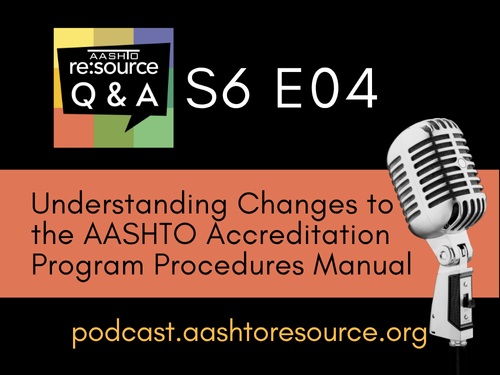On this episode of the AASHTO re:source Q&A podcast, Peter Unger provides an inside look at the global laboratory accreditation system that quietly protects our everyday safety. With nearly five decades of experience, Unger reveals how a problem with redundant product testing in the 1970s sparked an international movement that revolutionized how we ensure quality in construction materials and beyond.
[Above image by AASHTO]
AASHTO re:source is a technical service program offered by the American Association of State Highway and Transportation Officials that provides services and tools through three major programs: the Laboratory Assessment Program, the Proficiency Sample Program or PSP, and the AASHTO Accreditation Program or AAP.
This episode of the Q&A podcast – which originally launched in September 2020 – discusses the evolution of laboratory standards from early negotiations between the U.S. and Denmark to today’s sophisticated global network.
Unger – who helped write the original International Organization for Standardization or ISO Guide 25 (predecessor to ISO/IEC 17025) and chaired International Laboratory Accreditation Cooperation or ILAC for nine years – shares insider perspectives on how these systems developed and why they matter. His firsthand accounts of international diplomacy and standards development provide rare insights into a system most people never think about.
What makes this discussion particularly compelling is Unger’s candid explanation of how accreditation prevents dangerous practices. He recounts troubling examples of laboratories that would test just one concrete cylinder but report values for three such tests – taking shortcuts that could lead to catastrophic structural failures. Such stories highlight the real-world importance of proper testing oversight, especially in construction where lives depend on accurate results.
This Q&A podcast episode also demystifies complex topics like Mutual Recognition Agreements (MRAs) and Multilateral Agreements (MLAs), explaining how they facilitate international trade while maintaining quality standards. Unger’s work with organizations like the Canadian Lumber Standards Accreditation Board demonstrates how these agreements eliminate redundant testing of products crossing borders, saving money without compromising safety.
To listen to the full podcast episode, click here.
 AASHTO
AASHTO
Q&A Podcast: The AAP Procedures Manual Redesign
October 31, 2025 AASHTO
AASHTO

